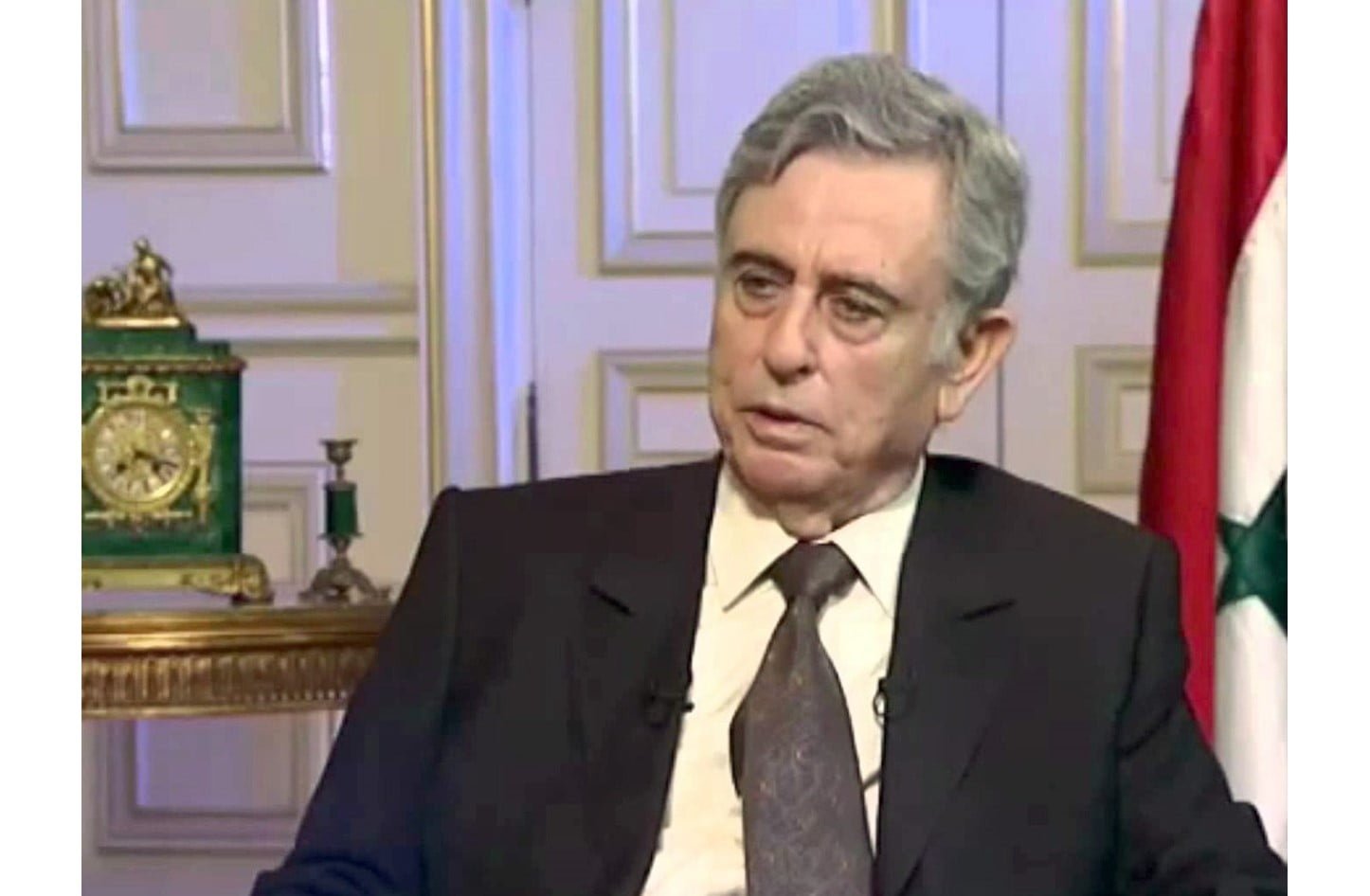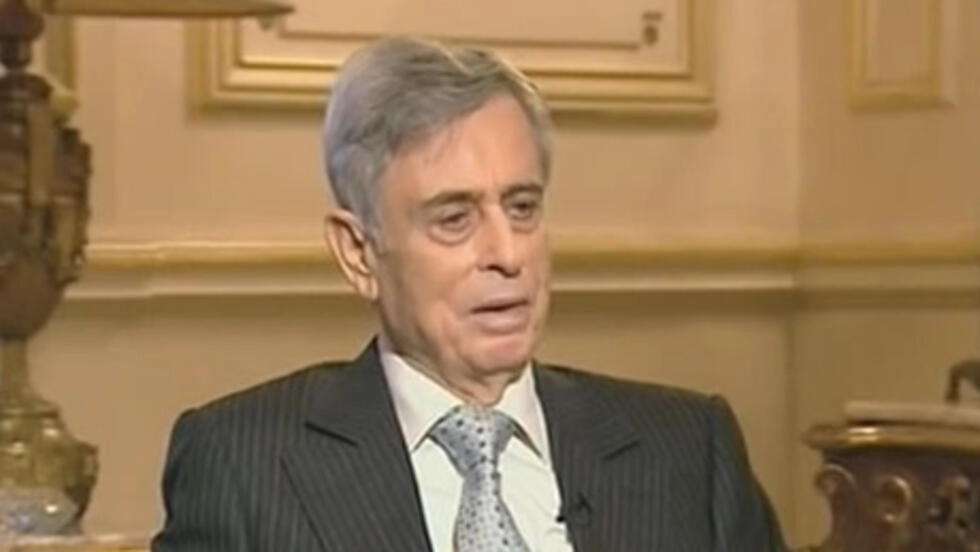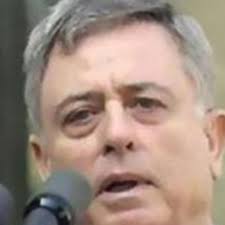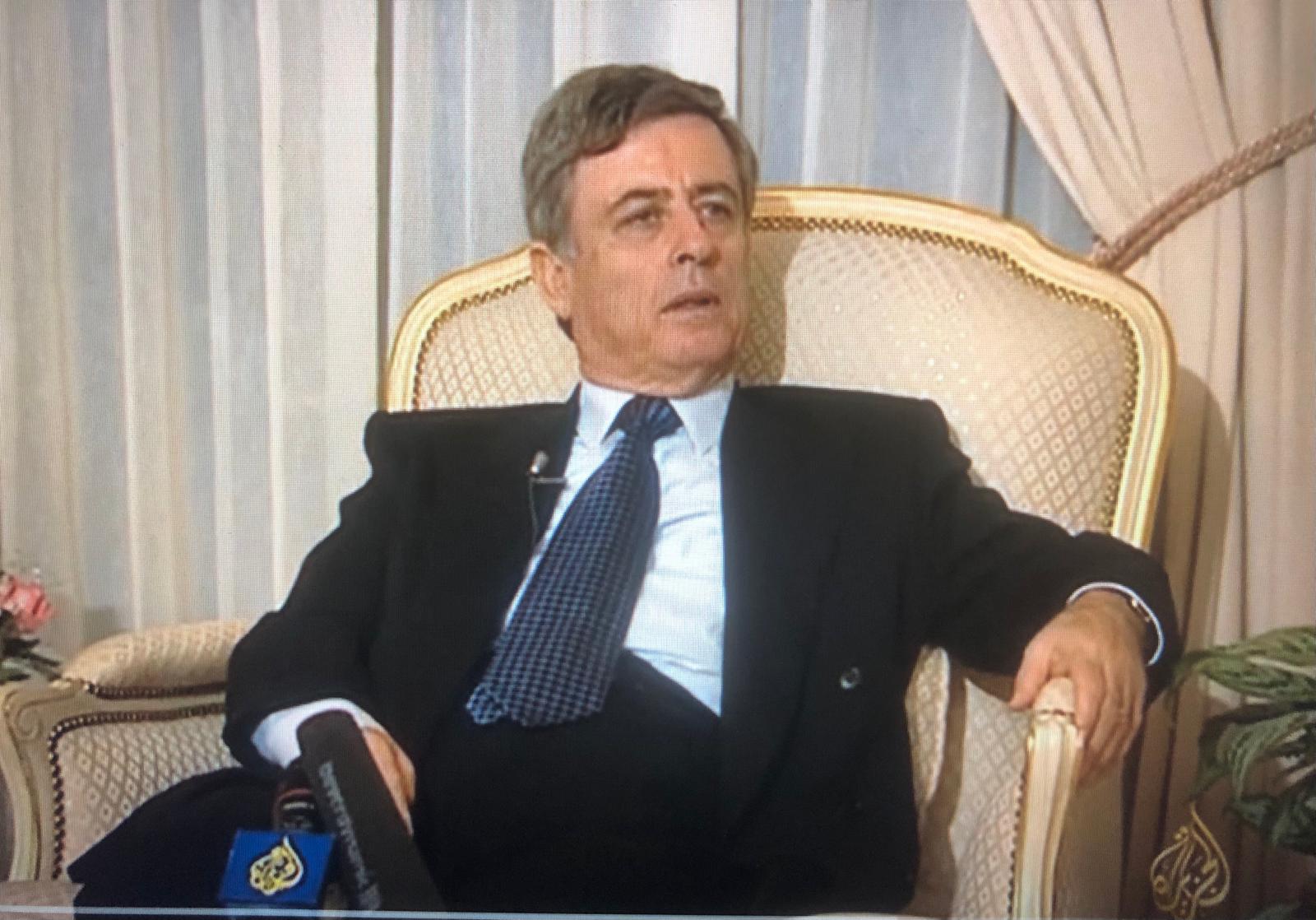Former Syrian Vice President Abdul-Halim Khaddam warned that the Syrian regime’s suppression of the “moderate” Islamist movement represented by the Muslim Brotherhood encouraged “extremists” to emerge in Syria. Khaddam also revealed that delegates from Arab governments had proposed to him the idea of carrying out a military coup instead of overthrowing the regime through a popular revolution. He expressed his belief that the Syrian army is not entirely loyal to the Syrian regime led by Bashar al-Assad, pointing out that the regime relies on the Republican Guard and security apparatus. Khaddam, who spent nearly four decades in power, also stated that only a minority of Alawites in Syria benefited from the regime, while the majority of the sect “resented” the control of the Assad family and the Makhlouf family (Assad’s uncle) over power and wealth. He emphasized that he and his allies in the National Salvation Front represent “a part” of the opposition and not “the entire opposition.”
Khaddam resigned from all his positions in the party and the state after the Tenth Qatari Conference of the Ba’ath Party held in June 2005. He announced his defection from the regime in December of that year and declared his intention to overthrow the regime, believing that President Assad personally was behind the assassination of Rafik Hariri. In March of the following year, Khaddam announced his alliance with the Muslim Brotherhood and opposition forces abroad, launching the “National Salvation Front” and the “National Project for Change” in Brussels.
In an interview published by the Akhbar Al-Sharq newspaper, Abdul-Halim Khaddam explained that the purpose of the Front is to “change the regime and establish democracy, and work on conducting fair parliamentary elections and elect representatives from all political blocs, who, in turn, will draft a new permanent constitution for Syria. Our mission is to transition the country from the stage of autocratic rule to democratic governance.”
Khaddam emphasized that “we are part of the Syrian opposition and not the entire opposition,” confirming the Front’s openness to “some parties” joining them “or negotiating with them, both within and outside the framework of the National Salvation Front.” He added, “We do not engage in competition with any Syrian opposition working to end the rule of this regime and striving for democracy.”
While Khaddam justified the National Salvation Front’s decision to reject the inclusion of Rifaat al-Assad (the brother of the late president and the uncle of the current president) and the head of the Syrian Reform Party in Washington, Fareed al-Ghadri, he revealed that Ghadri “sought to join the National Salvation Front, and we rejected it because he does not have popular support in Syria. He openly admits that he was created abroad, so we rejected his request. If he speaks on behalf of America, the path to the Americans is clear to us, and Ghadri cannot be a mediator in that.”
Khaddam explained that “our vision in the National Salvation Front stemmed from not waiting for the hesitation experienced by the parties of the ‘Damascus Declaration’ and our knowledge of the extent of the security pressures that restrict their movement and are imposed on them. The parties of the ‘Damascus Declaration’ failed to influence the regime and mobilize the streets.” According to Khaddam, “There are parties that have no interest in democratic change in the country, so they are trying to obstruct the logic of change.”
Khaddam stressed the necessity of “focusing on the issues of corruption, inflation, developmental failure, and addressing the plight of the 6 million unemployed citizens, which is one form of popular movement for issues that affect the suffering of this people, not slogans.” He also talked about mobilizing the streets and encouraging civil disobedience as a means to overthrow the regime.
While Khaddam pointed out that the Syrian regime is in a “crisis” and called for “dismantling the regime through various and lengthy methods,” he emphasized that he wishes “to employ international pressure, not to drag foreign countries into Syria as happened in Iraq.”
Khaddam believed that violent experiences like the Hama massacre in 1982 or the events of March 12, 2004, will not be repeated this time if the streets move against the regime. He noted the changing international conditions and the different “situation of the Syrian army (…) after the absence of some hardline officers from the army’s leadership, and the structure of the Syrian army today no longer allows for such violations.”
Khaddam expressed his confidence in the possibility of the Syrian army defecting from the regime, saying, “I know the composition of the army very well, and the entire army is not loyal to the regime. There is the Republican Guard and the security apparatus that protect the regime’s head, and there are contradictions within these apparatuses, even within the Republican Guard.” He clarified that “mobilizing the army against the regime is related to the increased popular movement and the exercise of internal and international pressure.”
In his assessment of the official Arab stance towards change, Khaddam said, “I have heard from several representatives of Arab government leaders who expressed their desire to initiate a coup against the authority and change the current regime under certain conditions. They fear a popular, democratic opposition and power-sharing in Syria, and that this contagion would reach their thrones and spread to neighboring countries,” according to Khaddam’s estimation.
However, Khaddam emphasized that “we do not want a change in power to occur through the military or coups. I do not have any bias towards any people or nationality, and I see all the peoples in the Arab homeland as having their own uniqueness but being subject to the Arab nation called the Arab homeland.”
“Fear of Extremism
While Khaddam saw that “raising the issue of minority and sectarian ratios serves the regime, and those who raise it are tools associated with the regime seeking to disrupt opposition and national unity with these matters and the backgrounds of these ratios,” he also acknowledged that Sunnis, alongside Kurds, represent 85 percent of the population in Syria, in addition to 9 percent of Alawites and 5 percent of Christians residing in Syria (after many of them emigrated). He explained that “the regime feels fear about the size of the religious trend, and the mistakes committed by the authorities have nurtured religiousness in Syrian streets.”
Khaddam emphasized that “the regime, through its actions and its rejection of the moderate Islamic trend, encouraged extremists within the Islamic movement.” He added, “Fear of the moderate Islamic trend represented by the Muslim Brotherhood encourages extremists and serves the regime’s goals.”
In his attempt to emphasize the moderation of the Syrian Muslim Brotherhood, Khaddam said, “If we remove the name of the Brotherhood from any political report or statement (by them), we do not notice a significant difference between what they write and the statements of other parties in the opposition.” He pointed out that “the Muslim Brotherhood is an important part of the change, just as the secular trend is in dire need of change as well.”
“The Alawites and the Regime
Khaddam believed that “Bashar al-Assad, who currently governs Syria, is impulsive and believes that Syria is his personal fiefdom. He is enthusiastic about the ideas of others but behaves poorly. He uses his influence and decisions but does not have absolute authority within the ruling circle.”
Khaddam cautioned that “the Alawite sect has become increasingly discontented with the rule of the Assad family and Makhlouf in Syria, accusing them of plundering the country’s wealth in the name of the sect. The sect is aware of the repercussions of this on the interests and future of the Alawite community.” The former Syrian Vice President said, “Everyone (the Alawites) talks about the massive looting and corruption of the Assad family and Makhlouf. The conditions in Alawite villages on the Syrian coast provide a clear contrast between each village. If there is a high-ranking and corrupt officer in one village, you can see the stark difference between his village and a neighboring one. This creates a sense of resentment among the members of the same sect,” according to Khaddam’s perspective.”
“The Kurds
Khaddam acknowledged the current situation of the Kurds in Syria, which he attributed to “isolation, exclusion, and injustice that the Kurds have been living through.” He considered this responsibility as part of the national solution, stating that the National Salvation Front views “the Kurdish movement as part of the political and national components in Syria, and therefore, we share common goals in the process of change and democracy.” He added, “The Kurds are part of Syria, and they are our partners in destiny. The overwhelming majority of Kurds consider themselves Syrians.”
Khaddam affirmed that “there is a problem and grievances against the Kurds in Syria, and the Kurdish people are a reality on the ground that cannot be denied. The Kurdish people in Syria have political and cultural rights, and they constitute a component of the nation, and their presence in one homeland strengthens national cohesion.”
However, Khaddam urged against raising issues that could complicate matters, such as changing the name of the “Syrian Arab Republic” to “Syrian Republic,” cautioning that it could lead to “stirring up the streets by the regime against the Kurds, portraying them as advocates of tearing Syria apart. The situation in Iraq plays a significant psychological and media role in serving the regime.”
Khaddam explained that “true partnership in Syria requires moderation. The issue of land and the Kurdish land issue can create sensitivities on the other side, with a feeling of Kurdish separation from Syria. Despite my belief that the majority of Kurds do not desire separation from Syria for various reasons, including their dispersed geographical distribution within Syria.” Kurds are spread along the northern borders of the country.
Khaddam rejected the principle of federalism, considering it challenging to implement in Syria on ethnic grounds. However, he pointed out that “there are differences in some solutions, as decentralization in governance and regional administration by a non-centralized administration could be a middle ground solution among other forms of self-rule and federalism.”
Khaddam concluded by stating, “All the details can be discussed within a legitimate government that recognizes the Kurdish people as partners in the nation. Through this recognition, we can discuss the role of this people and the nature of this partnership.” He mentioned that he had submitted over twenty memoranda during his time in power to resolve the Kurdish issue, such as the census and the issue of stateless individuals, but he claimed that the authorities had ignored them.”




